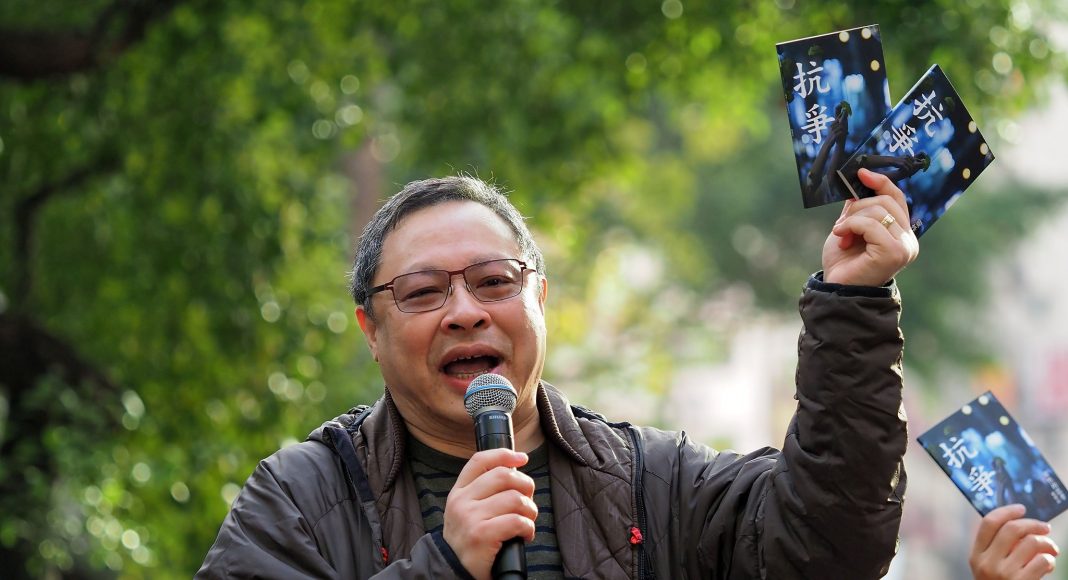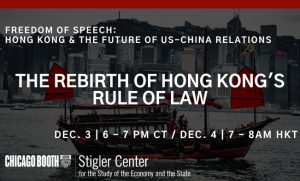Hong Kong’s rule of law has suffered a fatal blow. With the national security law, the authoritarian regime has all that it needs to enforce the authoritarian rule in Hong Kong.
Editor’s Note: This article is part of our ongoing debate on the impact of China’s new national security law on the freedom of expression in Hong Kong and everywhere in the world. Read previous articles in this series here. This is an excerpt from a longer piece to be published by the Chinese (Taiwan) Yearbook of International Law and Affairs.
The Chinese Government and the British Government considered the maintenance of the rule of law to be one of the common goals in their negotiations over the future of Hong Kong. The two governments reached an agreement on the future of Hong Kong in 1984. In 1997, the Chinese Government was to resume exercising sovereignty over Hong Kong. A new constitution of Hong Kong, the Basic Law of the Hong Kong Special Administrative Region (“the Basic Law”), was enacted by the National People’s Congress of the People’s Republic of China (“NPC”) in 1991.
Today, the plan to authoritarianize Hong Kong through law is underway. The practice to interpret the Basic Law by the Standing Committee of the National People’s Congress (SCNPC) is normalized. The Chinese Government can give any meaning to the Basic Law whenever it desires. The meaning given may even distort the Basic Law’s original language, and such additional meanings can also be applied retrospectively.
The latest interpretation by the SCNPC was an interpretation of Article 104 of the Basic Law concerning the requirements of oath swearing of office holders in the Hong Kong Special Administrative Region (HKSAR). All levels of Hong Kong courts, including the Court of Final Appeal, accepted the interpretation’s constitutional authority. Based on this interpretation, six legislators of the opposition camp who won elections in 2016 were disqualified on the ground that they failed to take the oath accurately, completely, solemnly, and sincerely.
Officials of the HKSAR Government would utilize every possible space in existing legislation to establish the legal authorization for authoritarianism. In doing so, the meaning of the legal text is arbitrarily extended or twisted and procedural fairness is ignored in legal procedures. The returning officers have the power to verify the validity of nominations under existing electoral laws. People were disqualified from running in elections because the returning officers found that they did not have a genuine and truthful intention to uphold the Basic Law. What the returning officers could rely on was the expressed opinions of these people supporting independence or self-determination of Hong Kong.
Making use of the reduced number of pro-democracy legislators in the Legislative Council after the disqualifications, pro-Chinese Government legislators pushed through amendments to the Rules of Procedures of the Legislative Council. All allowable mechanisms in the legislative chamber to withstand the encroachment of the authoritarian regime like filibustering by the opposition camp were removed.
Hong Kong’s rule of law suffered the most devastating blow when the Standing Committee of the National People’s Congress (SCNPC) enacted directly for Hong Kong a national security law. Based on a decision of the NPC, the SCNPC passed the “The Law of the PRC on Safeguarding National Security in the HKSAR” (“the national security law”) on June 30, 2020. The national security law is included in Annex III of the Basic Law and has been promulgated and implemented in the HKSAR directly without going through a local legislative process for the law, drafted in Chinese terms to adapt to the common law environment in Hong Kong. It states that the principle of the rule of law shall be adhered to (Article 5).
“The enactment of the national security law was a secretive process.”
The enactment of the national security law was a secretive process. The people of Hong Kong did not have any chance to see a draft. No public consultation was conducted. The law prevails over any local law provisions that are inconsistent with the national security law (Article 62). The SCNPC is vested with the ultimate authority to interpret the national security law (Article 65). The national security law in effect enjoys that same status of the Basic Law and has amended the Basic Law. However, the procedures of amending the Basic Law were not followed.
National security has been given a very wide understanding. It is an offense even if an act may be nonviolent but is committed with an intention to commit secession or undermine national unification. Many offenses are ill-defined, allowing significant discretion for law enforcement agencies to ban wide-ranging activities which have been permissible in the past. Punishments are disproportionately heavy for some prohibited acts.
The national security law claims an over-arching jurisdiction. It applies even to non-permanent residents of the HKSAR for acts committed outside HKSAR territory. People who may be remotely linked with Hong Kong could unknowingly commit an offense under the national security law by providing some kind of support to protesters in Hong Kong. Hong Kong Police can intercept communications and conduct covert surveillance on a person who is suspected of having been involved in the commission of an offense endangering national security. Only the approval of the Chief Executive, but no judicial approval, is needed. Trials for offenses under the national security law may be closed to the media and public if it involves state secrets or public order. The Secretary for Justice may issue a certificate directing that the case be tried without a jury on the grounds of protection of state secrets or involvement of foreign factors. The Chief Executive has the power to designate specific judges to handle cases concerning offenses that endanger national security.
The Commission for Safeguarding National Security (“Commission”) chaired by the Chief Executive possesses primary responsibility for safeguarding national security in the HKSAR. The National Security Adviser, designated by the Central People’s Government (“CPG”), has the authority to advise the Commission. The decisions of the Commission are not reviewable by the court.
The Office for Safeguarding National Security (“OSNS”) is to be established by the CPG. It has the authority to oversee how the HKSAR is performing its duties under the law. Under certain circumstances, the OSNS can exercise jurisdiction directly over a case concerning offenses endangering national security with the approval of the CPG. For such cases, the person alleged to have committed an offense under the national security law will lose all protections under Hong Kong law. The OSNS and its staff are not subject to the jurisdiction of the HKSAR; they can be said to be above the laws of Hong Kong.
“With the national security law, the authoritarian regime has all it needs to enforce the authoritarian rule of law in Hong Kong.”
With the national security law, the authoritarian regime has all it needs to enforce the authoritarian rule of law in Hong Kong. Hong Kong’s rule of law has suffered a fatal blow and the process of turning Hong Kong to authoritarian rule is near—if not entirely—complete.
The SCNPC made another decision that will have long term impact to Hong Kong’s democracy. It was that the election of the Legislative Council scheduled to be in September 2020 is to be postponed for at least a year. The official reason was that the covid-19 epidemic is not under control yet. However, the real reason was the successful primary elections of pro-democracy candidates held in July 2020. Around 610,000 voters participated, and this is a record-high turnout in primary elections.
The primary election reduced the number of pro-democracy candidates running in the official elections of the Legislative Council in September 2020. Due to the design of the election method of the Legislative Council, pro-democracy candidates would win more seats. There was a good chance that pro-democracy candidates would control a majority of the Legislative Council. If this were to happen, the Chinese Government would lose control over the Legislative Council, and the Chief Executive would have to face more intensive pressure from the opposition. The Chinese Government would never want to see this to happen. To date, it is unclear whether elections will be held in Hong Kong ever again.







